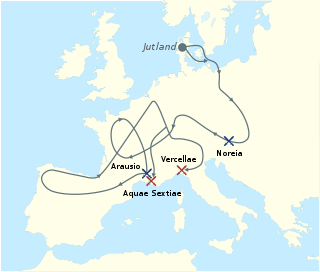Related Research Articles

The Battle of Arausio took place on 6 October 105 BC, at a site between the town of Arausio, now Orange, Vaucluse, and the Rhône river. Two Roman armies, commanded by proconsul Quintus Servilius Caepio and consul Gnaeus Mallius Maximus, clashed with the migratory tribes of the Cimbri under Boiorix and the Teutons under Teutobod.
Quintus Servilius Caepio was a Roman statesman and general, consul in 106 BC, and proconsul of Cisalpine Gaul in 105 BC. He was the father of Quintus Servilius Caepio and the grandfather of Servilia.
Lucius Licinius Crassus was a Roman orator and statesman who was a Roman consul and censor and who is also one of the main speakers in Cicero's dramatic dialogue on the art of oratory De Oratore, set just before Crassus' death in 91 BC. He was considered the greatest orator of his day by his pupil Cicero.
Gaius Norbanus, nicknamed Balbus was a Roman politician who was elected consul in 83 BC alongside Lucius Cornelius Scipio Asiaticus. He committed suicide in exile at Rhodes after being proscribed by Lucius Cornelius Sulla shortly after the latter's victory in the civil war.

This is a historical timeline of Portugal.
Gnaeus Mallius Maximus was a Roman politician and general.
Quintus Servilius Caepio was a Roman patrician, statesman and soldier. He was the son of Quintus Servilius Caepio who was consul in 106 BCE and who lost his army during the Battle of Arausio. He was elected praetor some time in the last 90s BC and fought for Rome during the Social War. He was killed in the second year of the war while fighting the Marsi by Quintus Poppaedius Silo.
Quintus Fabius Maximus Eburnus was a Roman statesman of the patrician gens Fabia. He was consul in 116 BC.
Mamercus Aemilius Lepidus Livianus was a Roman politician and military commander who was consul in 77 BC.
Gaius Laelius Sapiens, was a Roman statesman, best known for his friendship with the Roman general and statesman Scipio Aemilianus. He was consul of 140 BC, elected with the help of his friend, by then censor, after failing to be elected in 141 BC. Gaius Laelius Sapiens was the son and heir of the Punic War general Gaius Laelius, himself consul in 190 BC. This Laelius had been former second-in-command and long-time friend, since childhood, of the Roman general and statesman Scipio Africanus. The younger Laelius was apparently born around 188 BC, after his father had become consul but had failed to win command of the campaign against Antiochus III the Great of Syria, which would have made him a rich man. His mother's name is unknown.
Quintus Servilius Caepio was a Roman aristocrat, and the adoptive father of Brutus, the assassin of Julius Caesar.
The gens Servilia was a patrician family at ancient Rome. The gens was celebrated during the early ages of the Republic, and the names of few gentes appear more frequently at this period in the consular Fasti. It continued to produce men of influence in the state down to the latest times of the Republic, and even in the imperial period. The first member of the gens who obtained the consulship was Publius Servilius Priscus Structus in 495 BC, and the last of the name who appears in the consular Fasti is Quintus Servilius Silanus, in AD 189, thus occupying a prominent position in the Roman state for nearly seven hundred years.

The Gold of Tolosa was a treasure hoard seized by the ancient Roman proconsul Quintus Servilius Caepio from the Volcae town of Tolosa, modern-day Toulouse.
Quintus Fabius Maximus Servilianus was the adoptive son of Quintus Fabius Maximus Aemilianus and the natural son of Gnaeus Servilius Caepio --hence the adoptive cognomen Servilianus. He was consul of the Roman Republic in 142 BC together with Lucius Caecilius Metellus Calvus. He was the brother of Gnaeus Servilius Caepio and Quintus Servilius Caepio. All three brothers were commanders in the Roman Province of Hispania Ulterior and fought in the Lusitanian War.
Gnaeus Servilius Caepio may refer to a number of Roman consuls or senators:
Quintus Servilius Caepio was a Roman statesman. The son of Gnaeus Servilius Caepio, he served as consul in 140 BC alongside Gaius Laelius Sapiens. He was the father of Quintus Servilius Caepio.
The gens Mallia was a plebeian family at ancient Rome. Due to its relative obscurity, the nomen Mallius is frequently, but erroneously amended to the more common Manlius. The only member of this gens to obtain any of the higher curule magistracies under the Republic was Gnaeus Mallius Maximus, consul in 105 BC.
Marcus Porcius M. f. M. n. Cato was the father of Cato the Younger. His promising political career was cut short by his sudden death, early in the first century BC.
Gnaeus Servilius Caepio was a Roman politician who was consul in 141 BC; his colleague was Quintus Pompeius. He was the elder brother of one of his immediate successors in the consulship, Quintus Servilius Caepio, and the homonymous son of the consul of 169 BC.
References
- ↑ Livy (2007). Rome's Mediterranean Empire : Books 41-45 and the Periochae . Oxford University Press. pp. sxxxii–xxxiii, 105.
- 1 2 Smith, William (1870). Dictionary of Greek and Roman biography and mythology. Vol. 1. Boston, Little. p. 534.